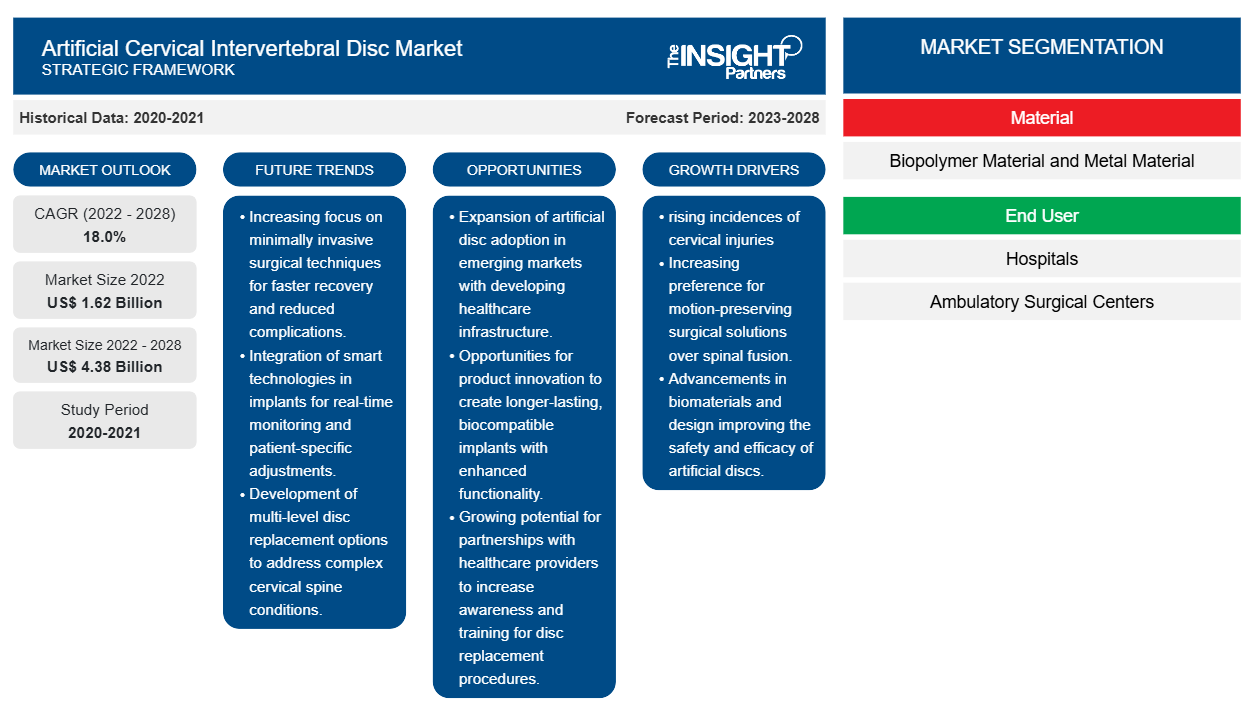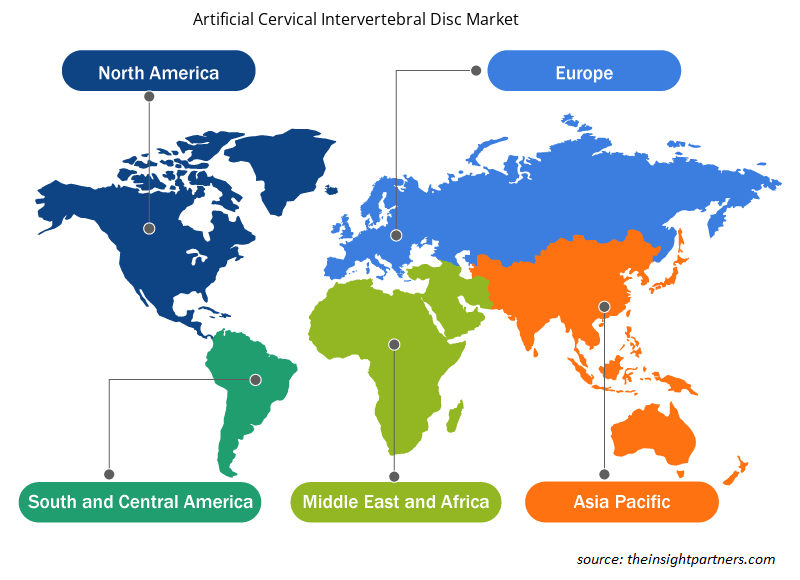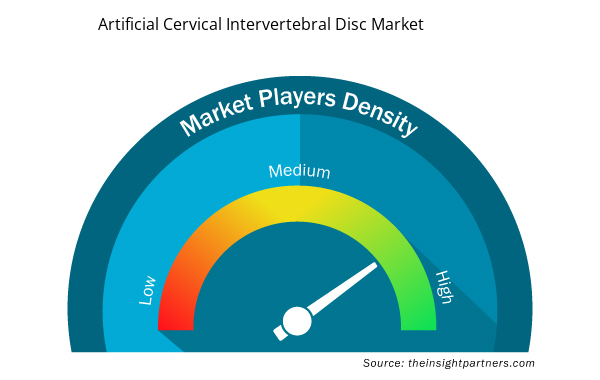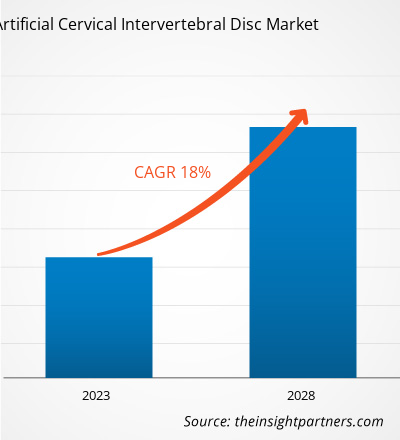[Research Report] The artificial cervical intervertebral disc market size is expected to grow from US$ 1,621.66 million in 2022 to US$ 4,375.29 million by 2028; it is estimated to grow at a CAGR of 18.0% from 2022 to 2028.
The growth of the artificial cervical intervertebral disc market is attributed to the rising prevalence of cervical injuries. Trauma is the major contributor to cervical injuries, including vehicle accidents, penetrating or blunt trauma, falls, and sports or diving injuries. As per the study “Estimating the Number of Traffic Crash-Related Cervical Spine Injuries in the US: an Analysis and Comparison of the National Crash and Hospital Data,” published in 2020, in the US, ~869,000 traffic crash-related cervical spine injuries are observed in hospitals annually, of which ~841,000 are sprain/strain (whiplash) injuries, 2,800 are spinal disk injuries, 23,500 are fractures, 2,800 are spinal cord injuries, and 1,500 dislocations. Further, most sports injuries are orthopedic injuries, including strains, sprains, fractures, broken ligaments, pain, and swelling; these may be acute or chronic. According to Stanford Children's Health, ~30 million youth and children in the US play sports annually, and more than 3.5 million sports-related injuries are reported each year. A cervical fracture results from high-energy trauma, such as a fall in gymnastics, hockey, football, or diving. The incidence of fractures is high in athletes. As per the Spinal Cord Injury Facts and Figures at a Glance, 2020, in the US, approximately 7.8% of the total spinal cord injuries (SCI) are due to sports. According to the US Consumer Product Safety Commission (CPSC), in 2018, ~23,720 neck fractures were treated at hospital emergency rooms in the US; of these, ~3,194 fractures were due to sports. The incidence of sports injuries increases with surged participation in sports and active participation in fitness activities due to the growing focus on healthy living worldwide. Additionally, as per the National Spinal Cord Injury Statistical Center, diving is the fifth leading cause of severe cervical spinal cord injury. Therefore, the demand for the artificial cervical intervertebral disc is increasing due to the rising incidences of cervical injuries.
The cervical intervertebral disc has the ability to absorb a huge compressive load while providing different types of motion between the bones in the neck. Market players have developed several artificial intervertebral cervical discs that are used to treat cervical disc problems. Artificial cervical disc replaces the movement and cushioning function of damaged cervical disc.
Customize This Report To Suit Your Requirement
You will get customization on any report - free of charge - including parts of this report, or country-level analysis, Excel Data pack, as well as avail great offers and discounts for start-ups & universities
Artificial Cervical Intervertebral Disc Market: Strategic Insights

- Get Top Key Market Trends of this report.This FREE sample will include data analysis, ranging from market trends to estimates and forecasts.
Customize This Report To Suit Your Requirement
You will get customization on any report - free of charge - including parts of this report, or country-level analysis, Excel Data pack, as well as avail great offers and discounts for start-ups & universities
Artificial Cervical Intervertebral Disc Market: Strategic Insights

- Get Top Key Market Trends of this report.This FREE sample will include data analysis, ranging from market trends to estimates and forecasts.
Market Insights
Rising Geriatric Population Drives Artificial Intervertebral Cervical Discs Market
The aging process affects the cervical spine, neck, shoulders, upper back, and arms. Cervical spondylosis is a term for age-related wear and tear of the spinal disks in the neck. It is a common disease and worsens with age. As per the American Academy of Orthopaedic Surgeons, ~85% of people with age more than 60 are affected by cervical spondylosis. With age, the vertebral discs, which serve as shock absorbers, gradually dry out and affect the strength. As per the Fact Sheet: Aging in the United States, the number of individuals in aged 65 and older is estimated to reach ~95 million by 2060 from 52 million in 2018, and its share in the total population is likely to spike up to 23% from 16%. Further, as per the report “Later Life in the UK 2019 - Age UK,” ~12 million (11,989,322) people aged 65 and above in the UK, of which 5.4 million people are aged 75 years or more and 1.6 million are aged 85 years of old. Additionally, Japan is another aging nation, with 28.7% of its population being 65 or older. The country’s “super-aged” society is the oldest globally. Thus, the growing aging population is likely to increase the demand for artificial cervical intervertebral discs.
Material–Based Insights
Based on material, the artificial cervical intervertebral disc market has been bifurcated into biopolymer material and metal material. The biopolymer material segment is likely to hold a larger share of the market in 2022, the growth is mainly attributed due to biocompatibility and ease of insertion offered by biopolymer material discs. However, the metal material segment is anticipated to register a greater CAGR in the market during 2022–2028.
The artificial cervical intervertebral disc market players adopt organic strategies such as product launch and expansion to expand their footprint and product portfolio globally and meet the growing demand. The developments by the companies in the global artificial cervical intervertebral disc market have been characterized as organic and inorganic developments. Organic growth strategies adopted by market players include product launch and expansion. Inorganic growth strategies witnessed in the artificial cervical intervertebral disc market were partnerships and collaborations. These growth strategies have allowed the market players to expand their businesses and enhance their geographic presence. Additionally, growth strategies such as acquisitions and partnerships helped strengthen the company’s customer base and increase its product portfolio. Organic developments hold 80.95% of the total strategic developments in the market, whereas inorganic strategies account for 19.05% of the growth of the companies.
Artificial Cervical Intervertebral Disc market has been segmented as follows:
The artificial cervical intervertebral disc market is segmented on the basis of material and end user. Based on material, the market is bifurcated into biopolymer and metal. The global artificial cervical intervertebral disc market, based on end user, is segmented into hospitals, ambulatory surgical centers, and others.
Artificial Cervical Intervertebral Disc Market Regional Insights
Artificial Cervical Intervertebral Disc Market Regional Insights
The regional trends and factors influencing the Artificial Cervical Intervertebral Disc Market throughout the forecast period have been thoroughly explained by the analysts at Insight Partners. This section also discusses Artificial Cervical Intervertebral Disc Market segments and geography across North America, Europe, Asia Pacific, Middle East and Africa, and South and Central America.

- Get the Regional Specific Data for Artificial Cervical Intervertebral Disc Market
Artificial Cervical Intervertebral Disc Market Report Scope
| Report Attribute | Details |
|---|---|
| Market size in 2022 | US$ 1.62 Billion |
| Market Size by 2028 | US$ 4.38 Billion |
| Global CAGR (2022 - 2028) | 18.0% |
| Historical Data | 2020-2021 |
| Forecast period | 2023-2028 |
| Segments Covered |
By Material
|
| Regions and Countries Covered | North America
|
| Market leaders and key company profiles |
Artificial Cervical Intervertebral Disc Market Players Density: Understanding Its Impact on Business Dynamics
The Artificial Cervical Intervertebral Disc Market market is growing rapidly, driven by increasing end-user demand due to factors such as evolving consumer preferences, technological advancements, and greater awareness of the product's benefits. As demand rises, businesses are expanding their offerings, innovating to meet consumer needs, and capitalizing on emerging trends, which further fuels market growth.
Market players density refers to the distribution of firms or companies operating within a particular market or industry. It indicates how many competitors (market players) are present in a given market space relative to its size or total market value.
Major Companies operating in the Artificial Cervical Intervertebral Disc Market are:
- Zimmer Biomet Holdings, Inc.
- Globus Medical, Inc.
- Centinel Spine, LLC
- Synergy Spine Solutions, Inc.
- Aditus Medical
Disclaimer: The companies listed above are not ranked in any particular order.

- Get the Artificial Cervical Intervertebral Disc Market top key players overview
Company Profiles
- Zimmer Biomet Holdings, Inc.
- Globus Medical, Inc.
- Centinel Spine, LLC
- Synergy Spine Solutions, Inc.
- B. Braun Melsugen AG
- Aditus Medical
- AxioMed LLC
- NuVasive, Inc.
- Medtronic
- Historical Analysis (2 Years), Base Year, Forecast (7 Years) with CAGR
- PEST and SWOT Analysis
- Market Size Value / Volume - Global, Regional, Country
- Industry and Competitive Landscape
- Excel Dataset



Report Coverage
Revenue forecast, Company Analysis, Industry landscape, Growth factors, and Trends

Segment Covered
Material, End User, and Geography

Regional Scope
North America, Europe, Asia Pacific, Middle East & Africa, South & Central America

Country Scope
Argentina, Australia, Brazil, Canada, China, France, Germany, India, Italy, Japan, Mexico, Saudi Arabia, South Africa, South Korea, Spain, United Arab Emirates, United Kingdom, United States
Frequently Asked Questions
An artificial cervical disc is a medical device designed to replace a natural disc in the neck through disc replacement surgery. It is inserted between two vertebrae in the neck and the surgery is generally performed in patients with a cervical disc herniation. The cervical artificial disc reduces the degradation of adjacent segments of the cervical spine and preserves normal neck motion.
The factors that are driving the growth of market are increasing incidences of cervical injuries and rising aging population. However, growing number of product approvals and developments is the major factor hindering the artificial cervical intervertebral disc market growth.
The artificial cervical intervertebral disc market majorly consists of the players, such as Zimmer Biomet Holdings, Inc.; Globus Medical, Inc.; Centinel Spine, LLC; Synergy Spine Solutions, Inc.; B. Braun Melsugen AG; Aditus Medical; AxioMed LLC; NuVasive, Inc.; Medtronic; and Orthofix Medical, Inc. among others.
The market is estimated to grow at a CAGR of 18.0% during the forecast period.
The artificial cervical intervertebral disc market is estimated to be valued at US$ 1,621.66 million in 2022.
The artificial cervical intervertebral disc market is expected to be valued at US$ 4,375.29 million in 2028.
The artificial cervical intervertebral disc market is analyzed on the basis of material and end user. Based on material, the market is segmented into biopolymer material and metal material. The biopolymer material segment held the largest share of the market. However, the metal material segment is anticipated to register the highest CAGR in the forecast period.
Asia Pacific is expected to be the fastest growing region in artificial cervical intervertebral disc market over the forecast period due to rising prevalence of the orthopedic diseases, increased in healthcare spending, and availability of advanced technology.
North America accounts for the major market share of artificial cervical intervertebral disc market in 2022 due to increasing aging population and the growing number of product approvals and developments.
Trends and growth analysis reports related to Life Sciences : READ MORE..
The List of Companies - Artificial Cervical Intervertebral Disc Market
- Zimmer Biomet Holdings, Inc.
- Globus Medical, Inc.
- Centinel Spine, LLC
- Synergy Spine Solutions, Inc.
- Aditus Medical
- AxioMed LLC
- NuVasive, Inc.
- Orthofix Medical, Inc.
- Medtronic
- B. Braun Melsugen AG.

 Get Free Sample For
Get Free Sample For